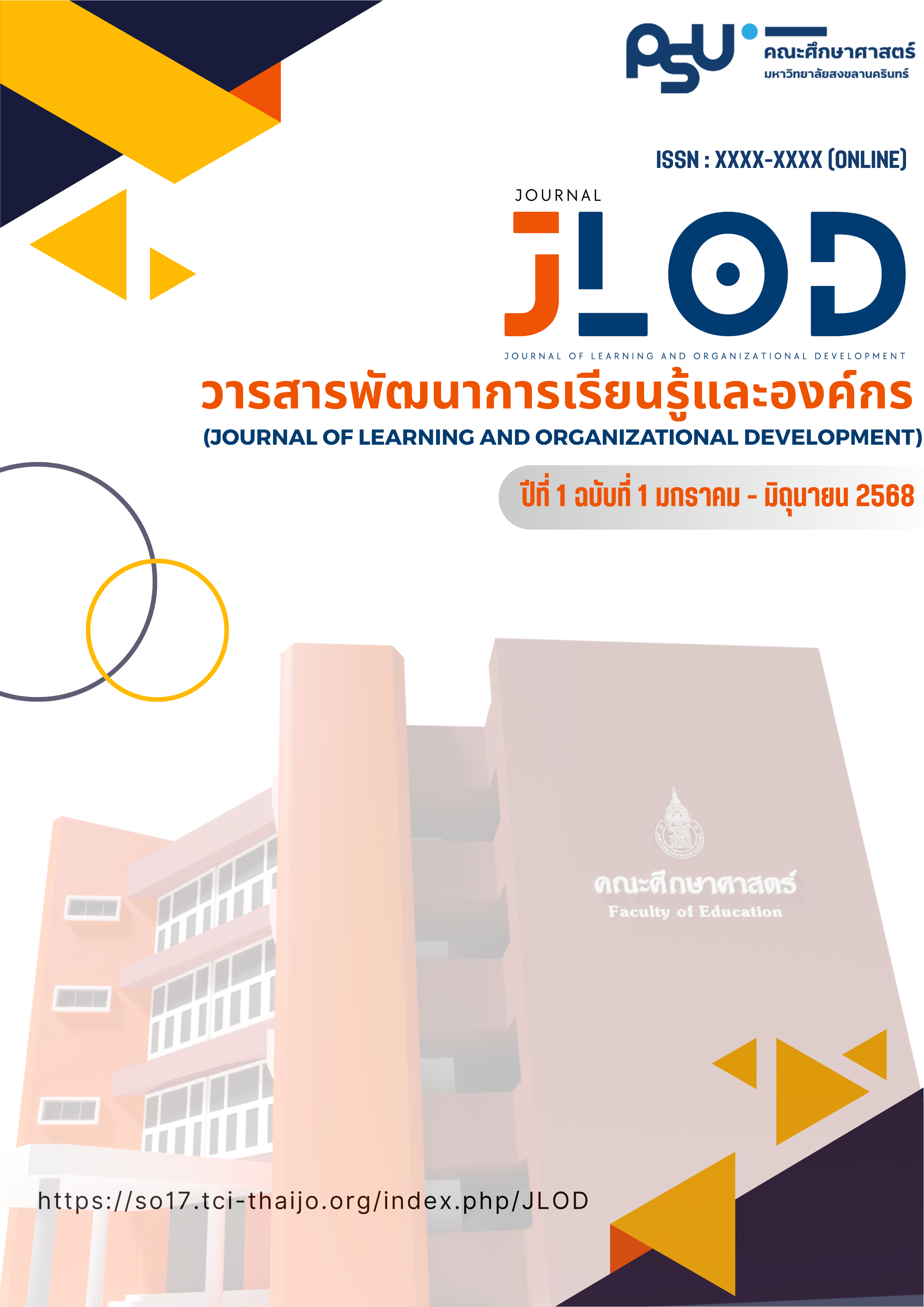การส่งเสริมทักษะทางสมองเพื่อการบริหารจัดการชีวิตของนักเรียนประถมศึกษาตอนต้น โรงเรียนสาธิตแห่งมหาวิทยาลัยเกษตรศาสตร์ โครงการการศึกษาพหุภาษา ศูนย์วิจัยและพัฒนาการศึกษา โดยใช้แนวคิดพหุปัญญา
คำสำคัญ:
ทักษะทางสมองเพื่อการบริหารจัดการชีวิต , แนวคิดพหุปัญญา , นักเรียนประถมศึกษาตอนต้นบทคัดย่อ
การพัฒนาผู้เรียนวัย 0-7 ปี ให้มีศักยภาพและสามารถปรับตัวในโลกแห่งศตวรรษที่ 21 ได้อย่างยั่งยืน จำเป็นจะต้องพัฒนาทักษะทางสมองเพื่อการบริหารจัดการชีวิต เป็นพื้นฐานของชีวิตให้สามารถต่อยอดในการเรียนรู้ด้านวิชาการและการดำเนินชีวิตได้ การศึกษาในครั้งนี้จึงมีวัตถุประสงค์เพื่อประเมินประสิทธิผลของกิจกรรมการส่งเสริมทักษะทางสมองเพื่อการบริหารจัดการชีวิต ของนักเรียนประถมศึกษาตอนต้นโรงเรียนสาธิตแห่งมหาวิทยาลัยเกษตรศาสตร์ โครงการการศึกษาพหุภาษา ศูนย์วิจัยและพัฒนาการศึกษาโดยใช้แนวคิดพหุปัญญาที่พัฒนาขึ้นในกลุ่มตัวอย่างผ่านการสุ่มอย่างง่ายจำนวน 92 คน จากจำนวนประชากร 120 คน ที่ลงทะเบียนเรียนในกิจกรรมพัฒนาทักษะการคิดด้วย EXECUTIVE FUNCTIONOF ปีการศึกษา 2566 ด้วยเครื่องมือการวิจัยคือ การส่งเสริมทักษะทางสมองเพื่อการบริหารจัดการชีวิต ของนักเรียนประถมศึกษาตอนต้นโดยใช้แนวคิดพหุปัญญา และแบบประเมินทักษะทางสมองเพื่อการบริหารจัดการชีวิต เพื่อการบริหารจัดการชีวิต (Executive Function) (KU-THEF) ใช้สถิติ t-test เปรียบเทียบค่าเฉลี่ยของคะแนนทักษะทางสมองเพื่อการบริหารจัดการชีวิตหลังการทดลองของกลุ่มทดลองสูงกว่าก่อนการทดลอง
ผลการวิจัยพบว่าคะแนนทักษะทางสมองเพื่อการบริหารจัดการชีวิตหลังการทดลองของกลุ่มทดลอง สูงกว่าก่อนการทดลองอย่างมีนัยสำคัญทางสถิติที่ระดับ .01 ซึ่งชี้ให้เห็นว่ากิจกรรมการส่งเสริมทักษะทางสมองเพื่อการบริหารจัดการชีวิต ของนักเรียนประถมศึกษาตอนต้นโดยใช้แนวคิดพหุปัญญาที่พัฒนาขึ้นมีประสิทธิภาพในการพัฒนาทักษะทางสมองเพื่อการบริหารจัดการชีวิตของผู้เรียน
เอกสารอ้างอิง
จุฑาภรณ์ มาสันเทียะ, โชติกา ภาษีผล และกมลวรรณ ตังธนกานนท์. (2019). การเปรียบเทียบความสามารถในการแก้โจทย์ปัญหาทางด้านพันธุศาสตร์ระหว่างผู้สอบที่มีความสามารถแตกต่างกันในการทดสอบที่มีการให้ข้อมูลย้อนกลับทันทีโดยใช้ระบบคอมพิวเตอร์: การประยุกต์ใช้ RISE Model. Journal of Education Studies, 47(4), 145-163.
Arulsamy, S., & Benjamin, A. S. (2024). Multidisciplinary Learning. 116–126. https://doi.org/10.1201/9781003504894-10
Blair, C., & Raver, C. C. (2015). School readiness and self-regulation: A developmental psychobiological approach. Annual review of psychology, 66, 711-731.
Bolstad, R., Gilbert, J., McDowall, S., Bull, A., Hipkins, R., & Boyd, S. (2012). Supporting future-oriented learning and teaching: A New Zealand perspective.
Brown, C. M. (2021). Outbreak of SARS-CoV-2 infections, including COVID-19 vaccine breakthrough infections, associated with large public gatherings—Barnstable County, Massachusetts, July 2021. MMWR. Morbidity and mortality weekly report, 70.
Burns, T., & Gottschalk, F. (2020). Education in the Digital Age: Healthy and Happy Children. Educational Research and Innovation. OECD Publishing.
Choudhary, M., & Rani, R. (2020). Life skills intervention program: A worth change in level of psychological capital of students. International Journal of Research, 7(7), 330–340. https://journals.pen2print.org/index.php/ijr/article/download/20133/19726
Conceição, P. (2020). Human development report 2020-the next frontier: Human development and the anthropocene. United Nations Development Programme: Human Development Report.
Diamond, A., & Lee, K. (2011). Interventions shown to aid executive function development in children 4 to 12 years old. Science, 333(6045), 959-964.
Gardner, R. C. (1983). Learning another language: A true social psychological experiment. Journal of language and social psychology, 2(2-3-4), 219-239.
Gleason, N. W. (2018). Higher education in the era of the fourth industrial revolution: Springer Nature.
Jadhav, A., & Deshmukh, S. A. (2024). An Analysis of Multidisciplinary Instruction in the Classroom. Indian Scientific Journal Of Research In Engineering And Management, 08(12), 1–9. https://doi.org/10.55041/ijsrem40310
Kolb, B. (1984). Functions of the frontal cortex of the rat: a comparative review. Brain research reviews, 8(1), 65-98.
McLennan, M. (2021). The Global Risks Report 2021 16th Edition.
Nurishlah, L., Sholihah, S. N., & Samadi, M. R. (2023). Minat Belajar Siswa Sekolah Dasar Berdasarkan Orientasi Kognitif. 1(2), 186–195. https://doi.org/10.69768/jt.v1i2.30
Sharma, K., Khosla, R., & Kumar, Y. (2023). Application of Morgan and Krejcie & chi-square test with operational errands approach for measuring customers’ attitude & perceived risks towards online buying. International Journal of Intelligent Systems and Applications in Engineering, 11(3s), 280-285.
Tabish, S. I., & Geelani, Prof. S. Z. A. (2023). Life skills: Need and Importance in Academics. Journal of Learning and Educational Policy, 32, 1–5. https://doi.org/10.55529/jlep.32.1.5
Timarán-Pereira, R., Caicedo Zambrano, J., & Timarán-Buchely, A. (2022). Applying Predictive Data Mining to Discover Factors Associated to the Language Skill Performance from Elementary School Students. Revista Facultad de Ingeniería, 31(62), e14814. https://doi.org/10.19053/01211129.v31.n62.2022.14814
Watson, C. S., Kidd, G. R., Horner, D. G., Connell, P. J., Lowther, A., Eddins, D. A., Krueger, G., Goss, D. A., Rainey, B. B., Gospel, M. D., &
Watson, B. U. (2003). Sensory, Cognitive, and Linguistic Factors in the Early Academic Performance of Elementary School Children The Benton-IU Project. Journal of Learning Disabilities, 36(2), 165–197. https://doi.org/10.1177/002221940303600209
ดาวน์โหลด
เผยแพร่แล้ว
รูปแบบการอ้างอิง
ฉบับ
ประเภทบทความ
สัญญาอนุญาต
ลิขสิทธิ์ (c) 2025 วารสารพัฒนาการเรียนรู้และองค์กร (JLOD)

อนุญาตภายใต้เงื่อนไข Creative Commons Attribution-NonCommercial-NoDerivatives 4.0 International License.






